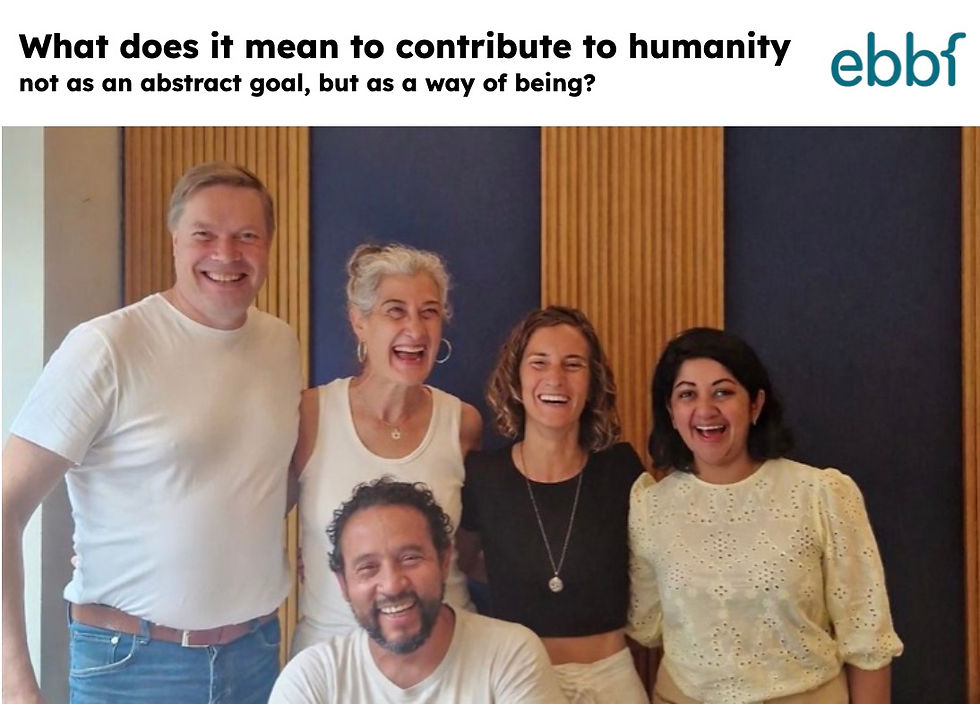#ebbfmember Nousha Ram on the traits of successful leadership for these complex times: agile, princi
- Aug 18, 2017
- 4 min read
In the previous two episodes of this three part interview with the late ebbf Advisory Council member Nousha Ram we heard here and here how leaders need to move away from creating repetitive tasks and towards making their teams’ work interesting, stimulating them and new thinking. Bringing about energy-creating processes. . In this third part Arlette George shares the third part of the interview where Nousha shares other key traits of the kind of adaptive and collaborative leadership, necessary in today’s and tomorrow’s organizations.
Collaborative leadership as the only way to progress in uncertain changing times
So where does Nousha Ram begin this transformative process?
From the moment she walks into the room: “The first thing I ask is Who Is Here? If we are to address the problem, that is the question we start with. Taking this opportunity to transform and reinvent, using the full participation of people involved. We don’t start with legacy, instead we start with engagement to create what is needed. Any other older style of managing will not survive beyond the next 5-10 years.”
She reveals how collaborative leadership in business needs groups to interlink and work together: “You want alignment with, and within, the ecosystem of their business. Courage is needed for big to be successful.”
But this courage is not uniform , it is rooted in the individual working within a cohort, a network, person to person: “Individuals need to be courageous, agile and able to constantly adapt and this is a big ask” and “you are invited to bring your whole self to the work place: a place where each individuals is asked to create a culture where diversity is valued, where you are creating a space for innovation, and you are asking, truly: How Do We Make This Work? How do we make this competitive?’, How does it earn money? How are we making the business successful? How do we make it relevant and useful to society?”
.
Understanding and harnessing diversity
To prepare an environment for innovation and success, understanding and harnessing diversity is a key element: “Diversity of thought and experience is important” because “This leads to very good consultation. Good consultation makes the company competitive; innovation relies on new thinking…”
Nousha Ram is particularly interested in seeing Generational Diversity working with the Senior Leaders to help sharpen the business: “They bring diversity of thought and of behaviours”, she says whilst talking about the process of Reverse Mentorship she introduced about 6-7 years ago: “Businesses need the millennials” and they need to: “Give the space – for the thinking, and ideas – to be brought to the table. The premise is, we need more diversity round the table to switch on those light bulb moments. We start with asking: How much diversity is there in the room? The quadrants of the pedigree of the leaders”, can now become “rooted within the diversity, and generational diversity of the human family.” By working consciously with Diversity, Nousha Ram sees: “This creates Convergence: a new Leadership mindset.” whereas “The old models of leadership lie in ‘being directed’, hierarchy, fearing failure.”
.
How to deal with change in an organization that cannot deal with change?
But what if you are living in a environment of constant change but can’t deal with change? What to do?
Nousha Ram summarizes the coaching transformation for any business faced with the complexities of the new world; possibly working with technologies that are already starting to get old; yet wanting to engage in innovation and bring fresh thinking to their operational thinking:
“The changes lie in support and empowerment. That, requires the Leaders to trust. Leaders need to become leaders who inspire with a vision. That, includes employees and ecosystems: to experiment; to work in networks not in hierarchies.” She concludes by saying that: “If you don’t include valuing Diversity, and diversity of thought, the principles of the business are not well founded. Remember… soundness of principles… or the business will ultimately fail. We have to go back. We have to ask how we can instill that in our culture.”
Nousha warns: “We can’t create diversity if you are trying in a superficial way” because we are working with “Consultation and decision-making” as instruments and tools of “Unity” which “can only be accomplished if we bring diversity, our whole selves, all of us, to the work of creating unity. This needs to include the supplier and the client. It needs to be authentic.”
.
free your people to make work meaningful and your team most engaged
Nousha maintains that for meaningful work to exist “people need to be freed up for decision making”, and we are now witnessing a new wave of innovation that is helping people able to embrace it to live this new phase. : “using data, big data and the analysis of artificial intelligence will liberate a great deal of new human innovation now unburdened by the repetitive work and decision making that a machine will do for us.” She views the implementation of robot-automation for “repetitive non-decision making tasks” in businesses which will open up “brand new contexts” for “Consultation and decision-making” and that will allow “people to do what they are best at” in order to provide solutions that will create ideal goods and services.
Yes, there is “uncertainty and constant change”. And yes, we are on the brink of “a whole new world” but she also sees, for example, with Citizen Services what before were unimaginable , diverse and unifying ways in which meaningful work can proliferate. This however is dependent upon an understanding that to secure our presence within this new world every organisation must learn about its reality with: “the soundness and worth of the principles upon which it bases the running of its affairs and the direction of its activities.”







Comments